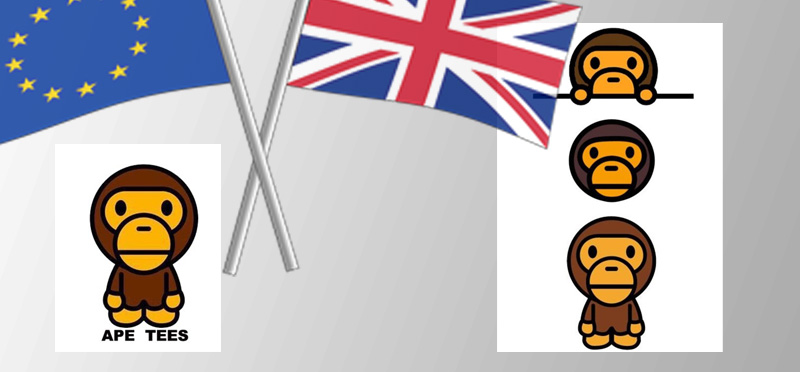CFI case-law: opposition proceedings after Brexit

The APE TEES trademark dispute before the CFI recently concerned opposition proceedings after Brexit. The issue was whether the parties in opposition proceedings can refer to rights existing in the UK even after the end of the transitional period to Brexit.
The case concerned the unregistered earlier national figurative marks depicting a monkey, and an ape. The trademark owner Nowhere Co Ltd (Japan) filed an opposition - before Brexit - against the EU figurative mark APE TEES, which was applied for in June 2015 by Mr. Junguo Ye (resident in Spain).
Nowhere Co's opposition was based on three unregistered earlier figurative marks used in particular in the UK in the course of trade. However, the opposition proceedings lasted several instances and several years. The EUIPO Board of Appeal reasoned that after the United Kingdom's withdrawal from the Union and the expiry of the transitional period on 31 December 2020, rights that may exist in the United Kingdom could no longer serve as a basis for opposition proceedings based, inter alia, on Article 8(4) of Regulation 207/2009.
This decision (Board of Appeal of EUIP, Case R 2474/2017-2) was challenged by Nowhere Co. before the CFI, specifically referring to the three unregistered earlier figurative marks of a monkey used in particular in the UK.
The question was: must an earlier right exist not only at the time the opposition was filed but also on the date on which the EUIPO finally decides on the opposition, i.e. the date on which the contested decision is adopted?
So, can the parties in opposition proceedings refer to rights existing in the UK even after the expiry of the Brexit transitional period?
After Brexit: opposition proceedings based on UK rights
The European Court (CFI) ruled on this in March 2022 (APE TEES T:2022:139). First, the CFI pointed out that the existence of a relative ground for refusal must be assessed at the time of applying an EU trademark against which an opposition has been filed. However, whether the earlier trademark loses its status as a trademark registered in an EU state after that date (as in the case of earlier trademarks used in the UK and the Brexit) is, in principle, immaterial for opposition proceedings, the CFI stated, referring to relevant case law (inter alia, judgments of 30 January 2020, BROWNIE, T 598/18 and of 1 December 2021, ZARA, T 467/20).
Similarly, it is irrelevant for opposition against an EU trademark that this opposition is based on UK trademark law (in the case APE TEES: according to Art. 8(4) of EU Regulation No. 207/2009 on the common law rules for action for passing off under UK law).
As the trademark application was filed before the end of the transitional period and even before the withdrawal agreement entered into force, the opposition could in principle be based on the unregistered earlier trade marks to the extent that they were used for trade in the UK, the CFI ruled - contrary to the view of the EUIPO Board of Appeal.
Consequently, a conflict between the marks at issue could have existed during the period from the filing of the EU trademark application until the end of the transitional period (in this case, from 30 June 2015 to 31 December 2020). According to the CFI, this was also true even if it were assumed that this conflict could no longer occur after the end of the transitional period.
The CFI, therefore, annulled the decision of the Board of Appeal of EUIP on 10 February 2021 (CFI, APE TEES, T:2022:139) It found that Nowhere Co. had a legitimate interest in the success of its opposition about the period between the date of filing of the EU trade mark application and the end of the transitional period, despite the UK's withdrawal from the European Union and the end of the transitional period.
Trademark protection, trade name, or product branding are also your topics?
Please contact us for more information at: info@kollner.eu.







